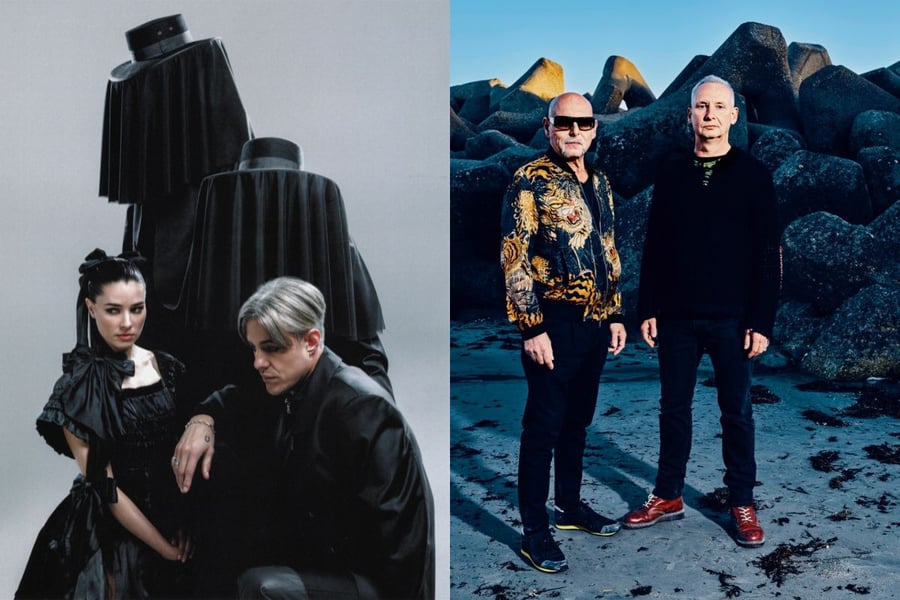At a glance, Confidence Man and Orbital share little in common. Confidence Man, or the snappier ConMan, an elegant hack that every band wishes they’d thought of first, hails from sunny Brisbane, Australia, and is led by Janet Planet and Sugar Bones, a pair that look like a party taking off. Then there’s Orbital, the Kent, England brothers Paul and Phil Hartnoll, whose essential cuts are among the defining works of electronic music’s golden era.
ConMan is one of Australian music’s great export stories, an electronic act which, thanks to the impossible energy of its vocalists, look as great as they sound. The Brits seemingly can’t get enough of them; it’s all there in the footage of their latest performance at Glastonbury Festival 2024.
The Brits love Orbital too, an act that has graced the stages of Glastonbury and boasts 10 studio albums — their last, Optical Delusion, went Top 10 in the UK in 2023 — with more to come.
On third album 3AM (LA LA LA), ConMan and its instrumentalists Clarence McGuffie and Reggie Goodchild leap feet-first into UK rave sounds from back in the day. Think acid techno, trance, breakbeat, big beat; all of it upbeat, with a decent splash of weird.
Orbital wasn’t just there, throwing hands in the air — they’re pillars of the scene. Orbital’s contributions are collected in new compilation A Beginner’s Guide, gathering their early chart hits “Chime”, “Belfast” and “Halcyon”, and more recent offerings “Ringa Ringa” and “Dirty Rat” (with Sleaford Mods).
The mutual respect between the acts is clear, and, as Rolling Stone AU/NZ discovered, these wave-generating artists in the world of electronic music have an awful lot in common.
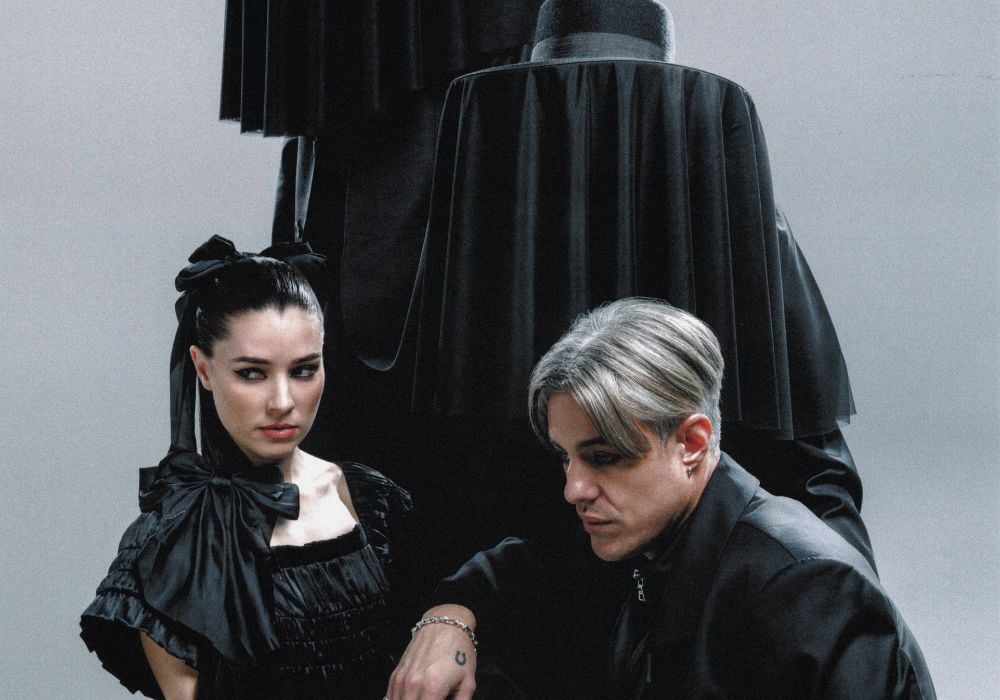
Image: Confidence Man Credit: Julian Buchan
Janet Planet: How do you make music? We can talk about that all day. The way that we’ve always started writing music was just having fun. It’s all about the dynamic between the three of us. So really, we mostly just get cooked. And Reggie already has some beats kind of ready. Then it’s like the three of us just in the room. Maybe, 16-hour periods is how we write most of our songs. And it slowly deteriorates throughout the night, and then we probably go home at 9am. We then re-look at the tracks the following week and cut out all the fat. Then we get all the good hooks and bits and kind of piece them all together. It’s about 16 hours in one session.
Love Music?
Get your daily dose of everything happening in Australian/New Zealand music and globally.
Paul: Sixteen hours in one session?!
Janet Planet: How do you guys do it?
Paul: Well, it’s completely different now. Don’t forget, we’ve been doing this professionally since 1990. It used to be pretty much the same when I was 22, Phil was 26, and we’d rock up at our parents’ house. They lived in a pub. We used to have everything set up in the living room. I lived there and Phil would come down from London. We’d just work through until 7am having started in the afternoon. So, it’s pretty similar. I don’t know how old you guys are. You’re a lot younger than us, and you’re still in that phase [laughs]. When you get to our age, things change and develop. I slowly came round to a kind of nine to five position of writing. But that slowly started happening when we moved to Shoreditch to a little room in [recording studio] Strongroom to do all our writing. They were long sessions. They’d often go right into the night, until 11 or 12, or later. I can remember leaving a note on the mixing desk because I’d gone to the pub and then come back and I was determined to finish the arrangement for “Halcyon” because we weren’t nailing it in the daytime. I came back drunk and just hammered into it and left a note at about four in the morning saying, “Don’t touch the desk. I think I’ve done it.” With my newfound life in London, I wanted to go out and socialise. So it meant swinging work in the studio to try and start earlier in the day so I could get shit done and then go out and party, you know? Until three or four in the morning. I was missing out on all the crazy shit that was going on around me.
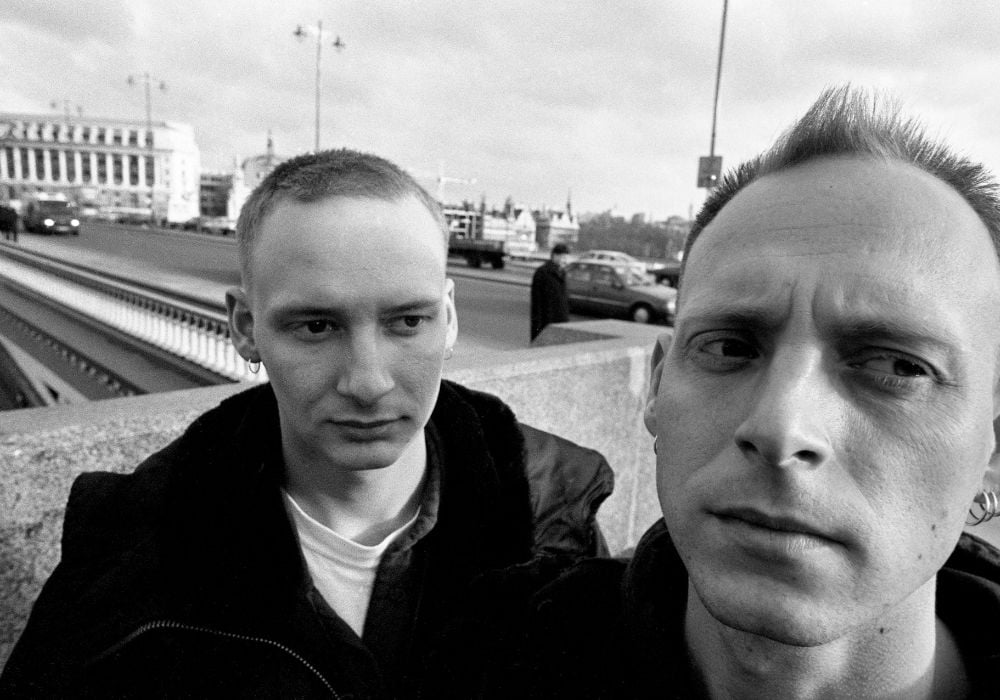
Image: Orbital Credit: Martyn Goodacre
Sugar Bones: The simple fix for that is you do it on a Tuesday or a Wednesday and then everyone’s kind of chilling anyway.
Janet Planet: I like doing it on a Tuesday because then you’re recovered by Friday and you can party again, and then you can get all your friends over to show them the new tracks that you wrote on Tuesday. That’s how we do it. We bombard all of our friends with the demos within the week, and piss them off.
Paul: I always found Friday was a really creative day. You’re all excited about the weekend. You’ve definitely got to finish early on Friday. We still find that, don’t we, Phil?
Phil: Yeah. Paul’s a real nerdy one. We’re really opposite. I’m the Tasmanian devil. ADHD boy.
Paul: He’s creative, but…
Phil: I’m not focused at all [in the studio].
Paul: I’m a lot more focused. We’ve always been global [minded], but it’s like when we started, dance music was a couple of drops, literally concentric, like dropping a stone in a pond and watching the ripples come out. We saw it happen through Europe and our gigs just got slightly wider and wider and wider. There was the exotic stuff going on in America with house music and Detroit techno and acid house. In the UK, everyone was running with that. It had its own slightly different sound, a bit more chaotic and punky, which birthed things like happy hardcore and jungle. Our first gigs were always around the UK, and then we started going to Holland. Slowly, it rippled out into Scandinavia. We tried France, but they didn’t like it. Same with Germany. We thought, “Oh, yes, Kraftwerk and Tangerine Dream,” but no. We were obviously the wrong tempo and the wrong type of techno. Everywhere we played, they didn’t like it. Spain absolutely love us. For some reason, we were always playing in Spain. It must be the Latin blood on our mother’s side.
Sugar Bones: That’s interesting, because that seems to be the same way for us. The countries that you’re talking about are the ones where we’re doing really well. One of the first songs we put out, “Boyfriend”, the UK label Heavenly heard that and dragged us over to England, very early on. We knew pretty early that the UK got us more than Australia did. It was like that situation of when a band pops up and they just belong somewhere else. We’re still trying to do the whole America thing. We’ve only just started that.
Paul: Dance music’s always seemed like a second-class citizen compared to “proper music,” rock music. We found that. I’ve noticed it at festivals, especially in the Nineties, where you’re in the same dressing room next to a few rock bands. They definitely would look down their nose at you a little bit like, “Oh, what do you know?” You might be headlining.
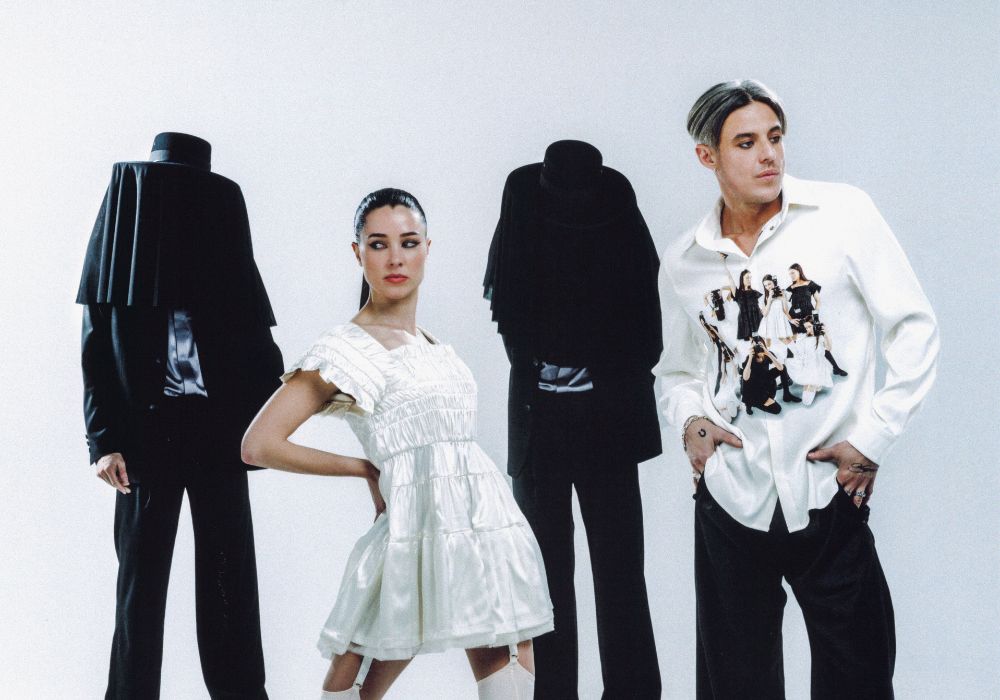
Image: Confidence Man Credit: Julian Buchan
Sugar Bones: That’s been the case through the history of music. In the Sixties and Seventies, rock was supreme. Dance music is only really just finding its stride. Festivals are taking their time to acknowledge that.
Phil: There’s a difference. There’s dance music that’s been specifically made for the dancefloor. There’s a tension [with festival operators]. And there’s electronic music in bands, which is what we’re trying to promote ourselves as. There’s a DJ and there’s the electronic [artist], and there’s still a bit of confusion. We’re unadulterated, jamming up there, which is rare live. In 1994 at Glastonbury, we went on after Björk as the “disco bit at the end.” That worked well, but it sort of bridged the gap between dance music and indie. Now they’ve got a dance field, thank god.
Janet Planet: It feels like indie bands stay in their lane and dance music stays in their lanes. I like it when people cross over.
Phil: I like to play the mainstream festivals because you reach new audiences.
Paul: When “Chime” came out and everybody kept booking us to play in their various clubs up and down the country, people would love “Chime”, but they wouldn’t like “Satan”. We used to clear dancefloors all the time in the UK with tracks like “Satan”. Within four years we were playing tracks like “Satan” at V Festival. When we discovered festivals and the festivals circuit realised that we worked with festivals, things really opened up. That’s a key thing. You lot are a good festival band. Everybody always says, “Did you see Confidence Man at that festival?” You’ve always been good at that. I remember seeing you in Dublin at Dún Laoghaire Pier.
Janet Planet: That was actually the first time we’d seen you guys play. I remember being like, “Who the fuck are these guys? These guys are incredible.” Our tour manager was like, “This is Orbital. How don’t you know who these people are?” From that point onwards, that was probably the kick in the arse for the dance phase for us, actually seeing you guys there. It’s funny you guys saw us at the same time.
Paul: You were a good festival act. You would command the crowd, people were loving it. Obviously that’s the dream for every band, isn’t it? To be good at festivals? It’s a great circuit. It does get you around the world and into weird places that you wouldn’t normally go.
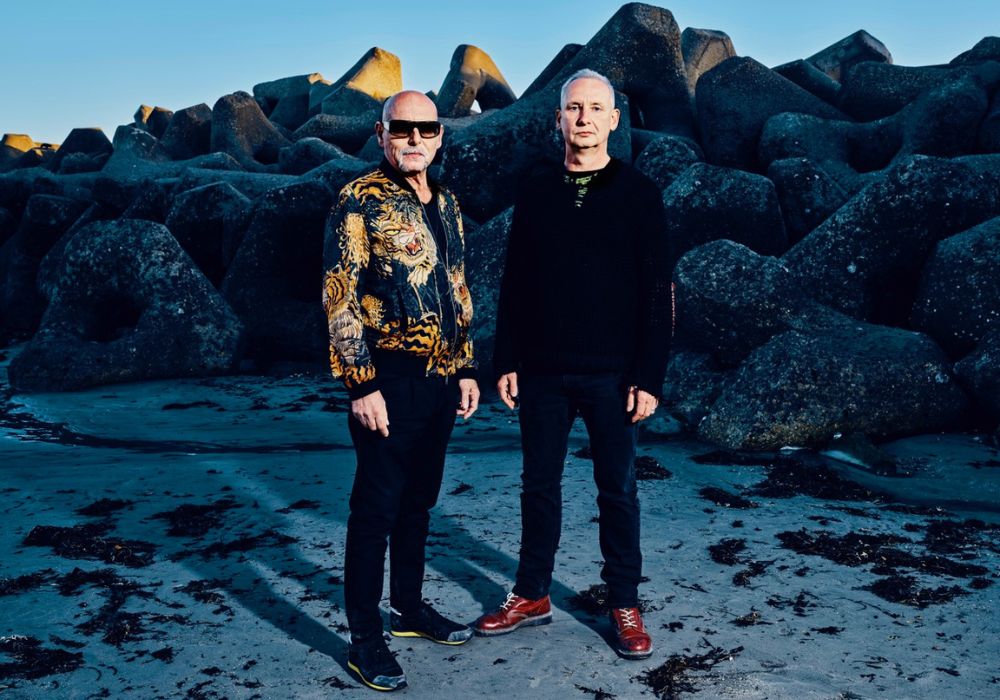
Image: Orbital Credit: Martyn Goodacre
Sugar Bones: Thinking back to when we first started making the songs with ConMan, we didn’t really think it was a band or anything. One of the things we considered when recording was, “Alright, it’s 2am, you’re at the biggest festival crowd ever, you’ve just had two pingers.” That was like the brief for every song. That big festival crowd vibe was where the band started, it was the music we wanted to make.
Janet Planet: I suppose the idea of what we wanted to do at 2am changed as we actually started partying more [laughs].
Sugar Bones: Let’s get together for a beer this week. I think we’d all like us to [collaborate].
Janet Planet: Tomorrow.
Phil: We’re remix-swapping. Since Covid, Paul and I tend to work separately in our little hobbit holes and then get together. We got together and had a really great time remixing “Far Out” [by Confidence Man]. It was so much fun. And I’ve got a confession. I go out DJing, mostly on weekends. I did try it out, in Coventry, this old-school sort of place. Oh, it went down wicked. I’ve got a little video. I’ll send it to you.
Janet Planet: It was really sick. When I listened to that remix, it was so identifiable as you guys. It wasn’t even an Orbital song, but it obviously was you.
Paul: Every step of the way, with the arrangement and the sounds and everything, it was like, “What would work if we were playing this live at a festival, any of the festivals we played over the summer?” It just felt exciting. I would put this in the live set.
The December 2024-February 2025 issue of Rolling Stone AU/NZ is on newsstands now.
Whether you’re a fan of music, you’re a supporter of the local music scene, or you enjoy the thrill of print and longform journalism, then Rolling Stone AU/NZ is exactly what you need. Click the link below for more information regarding a magazine subscription.
Visit the Rolling Stone Musicians on Musicians microsite here.

































